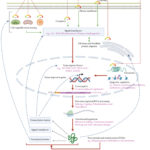Paper
It is vital to ramp up crop production dramatically by 2050 due to the increasing global population and demand for food. However, with the climate change projections showing that droughts and heatwaves becoming common in much of the globe, there is a severe threat of a sharp decline in crop yields. Thus, developing crop varieties with inbuilt genetic tolerance to environmental stresses is urgently needed. Selective breeding based on genetic diversity is not keeping up with the growing demand for food and feed. However, the emergence of contemporary plant genetic engineering, genome-editing, and synthetic biology offer precise tools for developing crops that can sustain productivity under stress conditions. Here, we summarize the systems biology-level understanding of regulatory pathways involved in perception, signalling, and protective processes activated in response to unfavourable environmental conditions. The potential role of noncoding RNAs in the regulation of abiotic stress responses has also been highlighted. Further, examples of imparting abiotic stress tolerance by genetic engineering are discussed. Additionally, we provide perspectives on the rational design of abiotic stress tolerance through synthetic biology and list various bioparts that can be used to design synthetic gene circuits whose stress-protective functions can be switched on/off in response to environmental cues.
Learn about our two Decals!
 Click here to find out more about our Fall Bioinspired Design Decal and our Spring Bioinspired Design in Action Decal – ALL MAJORS are welcome.
Click here to find out more about our Fall Bioinspired Design Decal and our Spring Bioinspired Design in Action Decal – ALL MAJORS are welcome.Berkeley BioDesign Community
 Click here to learn about the BioD: Bio-Inspired Design @ Berkeley student organization or here to signup for more info.
Click here to learn about the BioD: Bio-Inspired Design @ Berkeley student organization or here to signup for more info.Search
Student Login




I imagine that the neurological circuits underlying these processes are governed by both 2d spacing maps with their brains as…
to reduce the impact of car accidents, it may be possible to study the force diverting physics of cockroaches to…
you see this type of head-bobbing stability in many avian creatures related to pigeons like chickens. the head ability to…
not like they taught horses how to run! this is an example of convergent evolution where both sea creatures and…
The brain functions in a similar way with neuronal connections. our brains are able to utilize the multiplicity of connections…